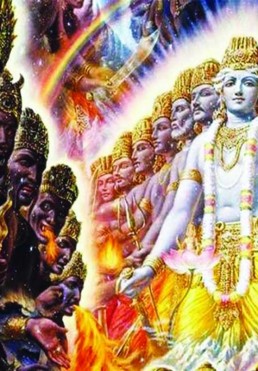Gita Chapter 16 – Verse 22 « »
एतैर्विमुक्तः कौन्तेय तमोद्वारैस्त्रिभिर्नरः ।
आचरत्यात्मनः श्रेयस्ततो याति परां गतिम् ॥ १६-२२॥
etairvimuktaḥ kaunteya tamodvāraistribhirnaraḥ
ācaratyātmanaḥ śreyastato yāti parāṃ gatim 16-22
A man who is liberated from these three gates to darkness, O Kaunteya, practises what is good for him and thus goes to the Supreme Goal.
etaiḥ = from these; vimuktaḥ = being liberated; kaunteya = O son of Kunti; tamodvāraiḥ = from the gates of ignorance; tribhiḥ = of three kinds; naraḥ = a person; ācarati = performs; ātmanaḥ = for the self; śreyaḥ = benediction; tataḥ = thereafter; yāti = he goes; parāṃ = to the supreme; gatiṃ = destination.;

